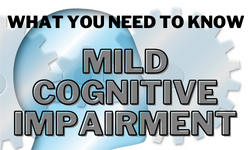
As people age, many notice a gradual increase in forgetfulness. For example, it may take a few seconds longer to recall a new friend’s name. Occasional forgetfulness is expected when aging, but if it becomes more consistent, mild cognitive impairment or other dementias may be present.
What is mild cognitive impairment (MCI)?
MCI is a general term defined by the Mayo Clinic as a subtle but measurable memory disorder. A person with MCI may notice their memory or mental function has changed; their family may also notice. However, these changes do not yet interfere with daily life.
What are the symptoms/signs?
- Forgetting things more often.
- Losing your train of thought.
- Decision making and planning feels overwhelming.
- Losing things more often.
- Change in visual perception.
- Trouble finding your way around familiar environments.
What is the cause?
There is not one single cause of MCI. However, the risk of developing MCI increases with age. Research suggests genetic factors may play a role. Also, persons diagnosed with diabetes, depression, cardiovascular disease, or stroke may have an increased risk.
Will it lead to Alzheimer’s?
Symptoms of MCI may get better, stay the same, or progress to Alzheimer’s disease or dementia. Since MCI may be an early sign of a more serious memory disorder, it is important to see a doctor or specialist if you suspect that your memory challenges are becoming more noticeable.
How to manage MCI?
- Make an appointment with a doctor.
- Participate in a clinical trial or study.
- Exercise regularly and eat nutrient-rich foods.
- Practice good hygiene and sleep habits.
- Stimulate your mind with games and puzzles.
- Engage socially with others.